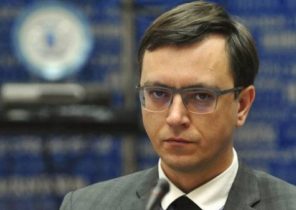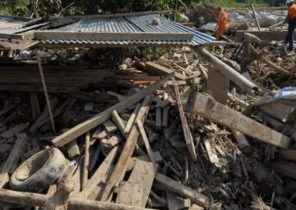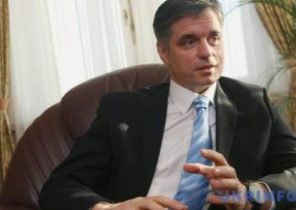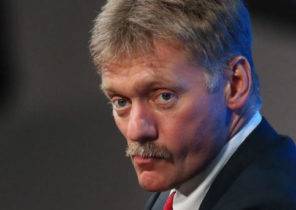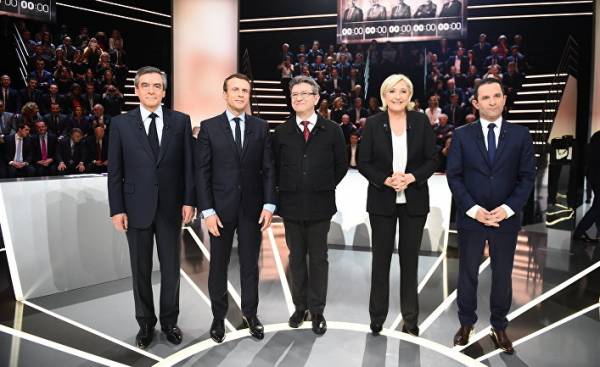
“I want to be President, stand for peace, and to hold a conference for security from the Atlantic to the Urals. Need to discuss again all the rest of the Soviet Union border. It is better to speak, not saber-rattling toward Russia,” said Jean-Luc Mélenchon at the debate the three main candidates on March 20.
Francois Fillon welcomed this and added: “We’ve changed the boundaries. [“But not by force!” ‘interrupted the journalist]. Not at all, take Kosovo. Again, we — the West, believe that we have to do anything to invade Iraq, establish their order in the whole region, because we are freedom fighters. There is one fundamental principle — the right of peoples to self-determination. There are boundaries that have been drawn are totally unacceptable for the people. And we can’t resist discussing these issues.”
After the statement of Benoit Amon that “the question of borders is the most sensitive of all,” Mélenchon said in seeking to clarify its proposal to the conference: “we Need to re-discuss all boundaries. The border between Russia and Ukraine after Crimea or before? Personally, I don’t know. This needs to be discussed”.
Marine Le Pen did not take the floor at this stage of the debate, but its position on these matters so well-known. On 3 January she told BFM: “I do not believe that there was an illegal annexation. A referendum was held, and the inhabitants of the Crimea expressed a desire to join Russia.” These words (she repeated in an interview with “Izvestiya” on 17 January) were a continuation of the traditional positive attitude of the leader of the National front to Russia. For example, in the press release of the parties dated July 17, 2014 after the Downing of Malaysia Airlines flight in Eastern Ukraine, urges to refrain from jumping to conclusions, “accusing the separatists and Russia, and even completely removing the responsibility from the Ukrainian army.”
At the meeting with Vladimir Putin in Moscow on 24 March, she made this statement: “We do not believe in diplomacy of threats, sanctions and blackmail, which the European Union is, unfortunately, increasingly holds in respect of the Russian Federation and its own members”. In addition, it reiterated its “point of view about Ukraine, which coincides with the opinion of Russia”.
To summarize. Three of the five major candidates for the French presidency believe that Russia’s behavior in the international arena and the tension around it there are two explanations. The first is the double standards of the West in relation to it. Second — the problem of borders between Russia and its neighbors, which should be reviewed at the end of the cold war: the West was not to do it, though did not deny it when it suited him, “for example” in Kosovo, as noted by Fillon. In addition, when one of the candidates offers a conference from the Atlantic to the Urals, that is, without the Americans, only one of them (Benoit Hamon), disputes the idea during the debate, despite the fact that it even endorses a candidate from the moderate right.
The proposal of Jean-Luc Mélenchon are unlikely to give something in practice: the idea of the conference on the revision of the borders is not serious, as all States, to the detriment which it may pass, will refuse to participate in it. This potentially applies to all of Russia’s neighbors, first and foremost Ukraine, Moldova, Baltic countries, Georgia and Azerbaijan. Of course, if we do not put into question the number of acquisitions of Stalin during and after world war II and will not allow Romania to request yourself Northern Bukovina, Finland — Karelia, and Germany — Kaliningrad (don’t think that Mélenchon had this in mind). In addition, known for its serious approach to diplomacy, the Russians themselves would never have accepted such a proposal, which would put them violators of European peace, angered the neighbours and United them against Moscow.
This extravagant idea deserves mention only to account for the fact that it sheds light: “provincialization” foreign policy debate in France and the peculiarity of our country that stands out in Europe redundant, poorly informed and misled by Russophilia.
As to the first point, even those who, like this writer, believe that the West has made mistakes in relation to Russia after the cold war and that NATO expansion was a threat, especially given the irresponsible hint of Ukraine and Georgia’s prospects of joining, know that these mistakes (fortunately, they were fixed after 2008) are balanced by other facts: the restrained behavior of the West against the background of the collapse of the Soviet Union (he chose the good one), favorable attitude to Russia as a successor of the Union, support of Boris Yeltsin, in particular the war in Chechnya, relations with Ukraine and during the crisis of 1997.
The West’s desire to humiliate and destroy Russia after 1991 — a myth. As for borders, it is worth Recalling that Russia had not done it for yourself a priority issue and confirmed them in voluntarily following the end of the cold war years (the main objective was to confirm the territorial status quo and, in particular, relations with Germany). The border was a sleeping issue which surfaced only because of the nationalist responded to the plans of Vladimir Putin. If we want to improve relations with Russia, we are faced with many questions, but borders, perhaps, the last of them, and raised it only in France by the debate on March 20.
In fact, (this is the second point) between France and Russia has a long and special affinity, which enhance the personal qualities of certain candidates. France has a dual Russophile position, both from the Gaullists and the Communists, the heirs of which are today possible to imagine françois Fillon and Jean-Luc Mélenchon.
At the same time, each brings something of their own. Fillon plays the loyalty of Philippe SEGUIN (Philippe Séguin), who held fast to the Franco-Russian Alliance, even during his most controversial performances in December 1994, and the experience of cooperation with Vladimir Putin as Prime Ministers of both of them (their communication is clearly brought Fillon, particularly in contrast to the minor role that left him with Nicolas Sarkozy).
Jean-Luc Mélenchon Russophilia is enriched with admiration civilizing imperialism: he celebrates the fact that the giants (of course, with the exception of USA) bring subjugate small Nations, such as China, which he praises brought to Tibet the enlightenment and universal values.
In addition, what comes to mind is his statement about Lithuania in the context of the referendum on the European Constitution in 2005. He then recalled that Europe took Lithuanians. “Yes, let them roll to hell! The Lithuanians? You now know a lot about Lithuanians? Personally, I have not seen a single one!” Subsequently he gave inaccurate information that the Lithuanian authorities have denied citizenship to 400 000 representatives of the Russian minority, and began to pay pensions to veterans of the SS (all residents of independent Lithuania granted citizenship, and in the country there were no SS units, in contrast to Latvia).
Finally, marine Le Pen Russophilia rests on the ideological roots that go back not communism or Gaullism, and the cult leader, and a strong regime (it connects both with Vladimir Putin). In geopolitical terms, marine Le Pen advocated withdrawal from NATO, as Jean-Luc Mélenchon, and strives for strategic Alliance with Russia and the “pan-European Union of sovereign States with the participation of Switzerland and Russia”, which should replace the EU.
Thus, the favorable attitude of the three candidates to Russia has different roots, but they all believe that the West had mistreated Moscow, and I want the rapprochement of Paris, particularly on the Syrian issue. As stated by françois Fillon on March 20, “the French policy against the “Islamic state” (banned in Russia as a terrorist organization — approx.ed.) was a complete failure. We have left Russia and Iran freedom of action, but would have had to fight with them.”
Benoit Hamon and Emmanuel macron a different opinion. First of all people who support causes a deterioration of relations with Russia is a diplomatic policy of the current President. The second is also critically comments on the alignment with the position of Russia. “Unlike you, I don’t tend to Pact with Vladimir Putin”, — he said Le Pen on March 20. In an interview with Libération on March 24, he took an even more clear line: “this is one of my major differences with Le Pen, Fillon and Jean-Luc Mélenchon: their admiration for Russia under Putin’s leadership is disastrous. With Moscow, of course, need to engage in dialogue to ensure stability in the middle East. However, we should not forget that it is, and what he does, the nature of her regime.”
Anyway, macron said more nuances in the sentences about politics in Russia compared to Francois Hollande: “I do not agree with some of the interventionism. Independence in Europe is needed in order not to merge with the other, to strengthen partners. I am for a policy of trust and responsibility because of our history — a century of history. Together we have built peace in the world through economic alliances, and sometimes Russia.”
On the website “Go!” we see support of dialogue with Russia and the gradual lifting of sanctions on certain conditions. Finally, on Syria macron believes it is a mistake to put the departure of Bashar al-Assad a precondition and stresses the need for cooperation with Russia to resolve the crisis.
Positions in Russia were relatively stable and, frankly, not very visible to the American attacks on Syrian base in response to a chemical attack with sarin on April 6. From the most favourably disposed to Moscow candidates we have heard condemnation (Mélenchon), surprise (Le Pen) and skepticism (“is understandable, but dangerous,” Fillon) about the American initiative.
Jean-Luc Mélenchon has altered the Franco-German press release with the support of the American strikes (“Bashar al-Assad bears full responsibility for these events. His endless use of chemical weapons and mass crimes cannot remain unpunished”) in a tweet: “Hollande and Merkel are responsible for giving Trump the sole right to strike at anyone, anytime” (as if they could really give the US President some right in the field of force!).
Marine Le Pen, whose closeness to Putin and Bashar al-Assad, support trump and hostility to NATO until reinforced by the cooperation of Putin and trump and the isolationism of the latter, clearly visible confusion. American strikes, warning against Putin, a reaction to the crime of Assad, a sign of activity of trump’s foreign policy — all this was a blow to her calculations.
The position of françois Fillon easier, because unlike marine Le Pen, he was not defending Donald trump. In any case, he distanced himself from U.S. operations may, in an effort to avoid the “alignment on US”, which seems to him the main sin of the foreign policy of Francois Hollande. He fears that American strikes could prevent the formation of a United front with Russia, to which he is calling on the Syrian issue, and lead to the Russian-American confrontation.
Alain Juppe (Alain Juppé, “the Supporters of real politics will still say to us that the Assad regime is a normal partner?”, he said after a chemical attack) supported the American operation, like most Republicans. Francois Fillon rejected the obvious conclusion that a carte Blanche to Assad on action in Syria is unlikely to push Russia to cooperate, and have stood by their opinion on background own camps and European partners of France, which indicates the strength of its convictions concerning Russia.
Benoit Amon expressed unconditional support for the us operations and suggested that “anyone who justifies Putin, to reconsider their views.” Emmanuel macron satisfied with that, “said the” American operation. Broadcast on France 2 (immediately after the chemical attack) he called for international action against Assad under the auspices of the UN with the participation of France (however, he did not explain how to convince the need for a Russia that does not share “our values and our preferences”). Unlike françois Fillon and Benoit Amon, he is clearly not eager to expose myself in this matter.
Overall, the most far-sighted stance on Russia belongs to Benoit Hamon, the youngest of the “big candidates”, which is now throwing their own electorate. Here he decided to break the non-aggression Pact with Jean-Luc Mélenchon, however, then the question arises about the advisability of such a step, because the rigidity in relation to Russia is hardly much more popular with the voters.
Whatever it was, his words can not approve: “When talking with Putin to come up with better arguments”. In other words, we need to try to improve relations with Russia, but it should not happen only on the basis of goodwill or the recognition of real or imaginary mistakes of the past, but relying on force, which will force Russia to take into consideration our point of view.
Perhaps the trump strikes in Syria will contribute to this. And, who knows, maybe declaring their realism, the candidates will pay a political price for that in the name of striving for cooperation with Russia showed only one openness and abstaining from the manifestations of rigidity, without which Vladimir Putin will not be the slightest reason to cooperate with us.




